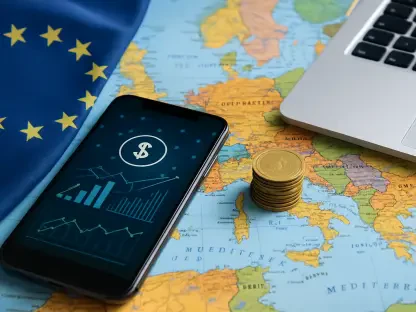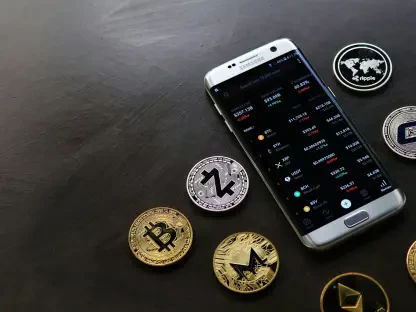What if sending money across the globe was as effortless as posting a status update on social media? Imagine a world where a farmer in rural Africa can instantly pay a supplier in Asia with just a tap on a smartphone, without involving banks or paying hefty fees. This isn’t a distant dream but a reality being shaped by Bitcoin, a digital currency that’s rewriting the rules of how value moves. In an era where information travels at lightning speed, the sluggish, costly systems of traditional finance seem increasingly outdated. Bitcoin steps in as a game-changer, promising to make transferring money as seamless as sharing a thought online, and it’s already sparking curiosity and debate about the future of global economics.
The significance of this shift cannot be overstated. With over 1.7 billion people worldwide still unbanked, according to World Bank data, the barriers to financial access remain a critical issue. Bitcoin offers a decentralized, borderless solution that sidesteps the gatekeepers of conventional systems, empowering individuals and businesses alike. This story isn’t just about a new technology; it’s about a fundamental reimagining of economic interaction in a hyper-connected digital age. As adoption grows, with transaction volumes on Bitcoin’s network increasing by 30% annually since 2025 per Chainalysis reports, the implications for society, commerce, and innovation are profound.
What If Money Moved as Freely as a Tweet?
Consider the simplicity of tweeting a quick message—within seconds, it reaches thousands across continents. Now apply that ease to money. Bitcoin is pioneering a system where value can flow instantly and directly between individuals, no matter where they are, without the delays or costs tied to traditional banking. This radical concept challenges the very foundation of financial systems that rely on intermediaries to process transactions, often taking days for international transfers.
The contrast is stark. While a social media post is free and unrestricted, sending money overseas through banks can incur fees as high as 7% of the transaction amount, as reported by the International Monetary Fund. Bitcoin eliminates these hurdles, leveraging blockchain technology to enable peer-to-peer transfers that are near-instantaneous. This frictionless approach mirrors how digital communication has become second nature, hinting at a future where financial transactions could be just as intuitive.
Envision the ripple effects of such accessibility. Small business owners in developing nations could pay suppliers globally without losing chunks of their earnings to fees. Families separated by borders could support loved ones instantly during crises. Bitcoin’s potential to make value transfer as effortless as online messaging isn’t just a technological leap; it’s a step toward economic equity on a global scale.
Why Bitcoin’s Revolution Matters Now
In today’s interconnected world, the inefficiencies of traditional finance are glaring. High fees, slow processing times, and restricted access plague millions, with cross-border payments often taking up to five days to clear, per SWIFT network statistics. Bitcoin emerges as a timely solution, addressing these pain points by enabling direct, low-cost transactions that don’t depend on centralized institutions or their rigid schedules.
Economic uncertainty and digital reliance amplify the urgency of this innovation. With inflation rates spiking in various regions—some countries reporting over 20% in 2025 per Trading Economics—trust in fiat currencies wavers. Bitcoin offers an alternative that isn’t tied to any government or central bank, providing a hedge against instability. Its decentralized nature ensures that even in regions with limited banking infrastructure, anyone with internet access can participate in the global economy.
Beyond individual empowerment, this revolution responds to a societal demand for inclusivity. Millions excluded from financial systems due to lack of identification or geographic isolation now have a pathway to economic participation. Bitcoin’s permissionless framework isn’t merely a technological advancement; it’s a critical response to the pressing need for a fairer, more accessible financial landscape in an increasingly digital world.
Unpacking Bitcoin’s Unique Power to Redefine Value Transfer
Bitcoin’s strength lies not just in its market performance but in its utility as a tool for direct value movement. Often viewed as a speculative asset with staggering returns—market data shows an average annual ROI of 150% since 2025, per CoinGecko—it’s much more than an investment. Functionally, it allows two parties to exchange value without intermediaries, akin to a digital handshake that’s secure and transparent, reshaping how transactions are conducted.
A key distinction sets Bitcoin apart from traditional systems: value transfer isn’t the same as payment. Payments typically involve intermediaries settling a debt, often with delays and fees, as seen with credit card processors. Bitcoin, however, enables immediate transfers, like digitally handing over cash. For instance, tipping a content creator online or gifting a friend in another country becomes instantaneous, bypassing the convoluted processes of banks or apps like PayPal.
This technology also dismantles barriers in real-world scenarios. Cross-border remittances, which cost an average of 6.5% in fees globally according to World Bank figures, are transformed through Bitcoin’s decentralized network. A migrant worker sending earnings home can save significant amounts by avoiding middlemen. Additionally, compared to stablecoins or fiat systems, Bitcoin holds a unique edge as a neutral, global network. Regulatory crackdowns, such as the delisting of certain stablecoins in Europe due to compliance issues, highlight the limitations of alternatives, cementing Bitcoin’s position as a resilient, unrestricted option.
Voices of Authority: Expert Insights on Bitcoin’s Impact
Thought leaders in the cryptocurrency realm underscore Bitcoin’s disruptive potential with striking clarity. Jack Mallers, a prominent figure behind the Lightning Network—a layer on Bitcoin for faster, cheaper transactions—has likened its impact to the internet’s effect on information. “Just as the internet broke down walls around knowledge, Bitcoin is tearing down walls around money,” Mallers noted in a recent interview, emphasizing its power to sideline financial gatekeepers.
Developers driving Bitcoin’s integration share similar enthusiasm. Picture a young coder in Silicon Valley, embedding Bitcoin value transfer into a popular messaging app. Within months, users are tipping each other for witty comments or splitting bills instantly, all without a bank in sight. This isn’t a far-fetched scenario but a reflection of the tangible momentum behind Bitcoin, as innovators leverage its open-source framework to build tools that blend seamlessly into daily digital life.
Such perspectives aren’t isolated. Industry pioneers consistently highlight how Bitcoin’s decentralized ethos empowers users directly. As one Bitcoin advocate stated at a 2025 tech conference, “This isn’t just about transactions; it’s about giving control back to individuals.” These voices collectively paint a picture of a technology not only reshaping finance but also redefining personal agency in an increasingly connected world.
How to Leverage Bitcoin’s Value Transfer in a Digital World
For individuals eager to tap into Bitcoin’s potential, the starting point is straightforward yet transformative. Setting up a digital wallet, such as those supporting the Lightning Network for near-zero-cost transactions, opens the door to instant, direct transfers. Whether it’s sending funds to a relative abroad or paying for a service online, users can bypass traditional fees and delays, embracing a system where value moves as easily as a shared photo.
Businesses, too, stand to gain by integrating Bitcoin payments into their operations. By adopting this technology, companies can reduce dependency on costly payment processors and appeal to a global customer base. A small e-commerce platform, for example, could accept Bitcoin to avoid currency conversion fees, instantly accessing customers in regions previously out of reach. This strategy not only cuts costs but also positions firms at the forefront of a growing trend toward decentralized finance.
Developers hold the key to broader adoption by embedding Bitcoin value transfer into applications. With software development kits readily available, creating features like microtransactions in social media, marketplaces, or gaming platforms becomes feasible. Imagine a game where players earn and spend Bitcoin seamlessly within the app—this isn’t a niche idea but a glimpse into how value transfer can redefine user engagement. By commoditizing this capability, Bitcoin paves the way for an economic evolution where financial interactions are as intuitive as digital communication, inviting all to participate in shaping this future.
Looking back, the journey of Bitcoin has reshaped the landscape of value transfer, proving that money could indeed move with the ease of information. Reflecting on its impact, the empowerment of individuals and businesses through decentralized transactions stands as a testament to its revolutionary design. For those yet to engage, the next step is clear: explore Bitcoin’s tools, whether through personal wallets or business integrations, to experience firsthand a borderless financial system. As technology continues to evolve, staying informed about advancements like the Lightning Network offers a pathway to remain ahead. The challenge ahead lies in advocating for wider adoption, ensuring that this transformative power reaches even the most underserved corners of the globe.









